Words and photos by Tyron Francis
A few years ago I got talking to a couple of girls outside a club through some dude I sort of knew, we all ended up at the same house party. There was this guy there who I'd seen playing wacky acoustic guitar once and I said to one of the girls that he was like the Rowland S. Howard of Swansea. She was all "my dad made an album with him!" Obviously I was a bit unsure of whether to believe such a statement, I ended up back at her place and she and her friend played me some songs on piano by Leonard Cohen, Nick Cave, The Velvet Underground and a bunch of other greats. I decided to believe her claim. Jeremy Gluck was the lead singer of The Barracudas, the legendary surf punk band from the early 80's; they enjoyed some commercial success including a memorable appearance on Top of the Pops before breaking up in 1984. Jeremy went on to record a solo album that has been credited with inventing alt-country 10 years before the term was even created. He recently answered some questions for me about his early influences, what he's up to these days and some of his high points in the music industry.

THB: What kind of bands were you into growing up in Canada?
JSG: The decisive moment for me came when, at twelve' my older brother gave me his needle-worn copies of the Velvet's 'White Light White Heat', The Stooges' 'Funhouse' and The Who's 'Meaty Beaty Big and Bouncy'. At that time, I already had good taste, naturally, but this killer trio of classics pretty much dictated the course of my musical taste thereafter, especially The Who, who became idols of mine (and still are, I am not ashamed to confess!). Add to the core trio The Beach Boys, and you have my cornerstones. In addition, there was alot of fabulous Canadian pop and rock little known beyond the border, artists like Michel Pagliaro and Murray McLauchlan, whose singles I adored. I got into a lot of good music courtesy of my friends the Jones brothers: The Kinks, the Flamin' Groovies and many more. We lived for British imports. I saw some awesome shows, too, including early Bruce, loons like KISS (Simmons' hair caught fire during the fire-breathing stunt and a roadie had toi extinguish it!) and many more like Roxy Music, Alice Cooper, prime Bowie...it goes on and on.
THB: How old where you when you realized that you wanted to make music as well as listen to it?
JSG: About twelve is when I left behind my childhood concerns and embarked upon an obsession with music that in a few years made me certain I was not likely to become an accoutant.
THB: Tell me about the journey from then until forming The Barracudas.
JSG: "Journey" is a rather exulted term, "stumble" or "stagger" might be more apt. In my later teens, I formed a few bands. They were basically punk bands, and we even had a few decent songs, including one entitled 'I Got Nothing' which name I later found out also graced a Stooges number! Probably the pinnacle of my teen moments was performing an imprompru 'Dirt' at lunchtime to a bewildered audience of my high school peers. I continued to scheme, and when I lived in Toronto I tried to form a band, too; we got as far as rehearsing Link Wray's 'Rumble', which to me still seems a classy achievement.
THB: You had some commercial success with The Barracudas, tell me everything there is to know about your time in the band.
JSG: No. A substantial amount happened, really. I hate to be a pain but a very good source of info on this is at http://www.nkvdrecords.com/barracud.htm. As far as commercial success goes, um, well, after a summer of hyping it our debut EMI single did get to thirty-seven for a few weeks, but in those days that meant like 50,000 sales! Then a lot of things fucked up (e.g. pressing plant strike etc.) and our next EMI singles did poorly. I did, however, during a TV session, emerge from the studio to see the cast of Coronation Street walk past. And then, mystically, not long after there was a scene in the pub on the show and...there was a Barracudas poster on the wall! How can I top that???
THB: You were writing for some music magazines at the time as well weren't you, did that help at all?
JSG: Yes and no. Most music journos are suspicious of musician-journos...after all, they have done it. We did get a little sympathetic coverage. I mean, we were on the cover of SOUNDS prematurely because I knew Tony D. (of Ripped and Torn fanzine fame) who at the time knew Sandy Robertson who was big at the paper then. But we got better press abroad regardless. The French for a time rejoiced in calling us the new Groovies, which experience was for a long while better than sex.

THB: How did you come to work with Rowland S. Howard on I Knew Buffalo Bill?
JSG: The genesis of my working with El Howard has some curious roots. Back-in-the-day when I was first living in London and launching The Barracudas, I'd often hang out at Rough Trade in Ken. High Street. We mursed hopes of the label adopting us, but weren't precious enough for them...lovely as they were. Anyhow, one band that did record from was the impenetrable Swell Maps, with whom we did a memorable show at The Nashville. One of the key maps was Nikki Sudden; we became quite good friends and by '83 were discussing recording together, as we shared a huge interest in vintage country music and early rock'n'roll. We did some demo's and then adjoured. Meanwhile the Maps and Barracudas split. Nikki and I kept in touch, hung out and wrote some songs. On a parallel timeline The Birthday Party had scorched London, imploded and spat forth Rowland S Howard, who Nikki got to know through is brother Epic, whose bands Crime and the City Solution and These Immortal Souls Rowland led. I had met Rowland a few times in my journalist role, but knew little of him otherwise, whereas he and Nikki had become big friends. In late 1986 Nikki and Rowland were ensconced in Fairport Conventioner Dave Pegg's studio Woodworm, knocking out junk for Creation, when I received a call from Nikki: Should he tag another week on the session and make an album with me? I was understandably excited at the prospect, having one of the greatest guitarists in human history dumped in my lap, plus in Epic a legendary drummer. We recorded and partly wrote the album in two sessions. Rowland played largely from instinct, we planned so little of any of the record. He did some remarkable things, though. I spoke to him last when Nikki died. Epic was already gone; I gather Rowland is now resurrected from a battle with Hep C and I hope he lives a long time...no way I want to be the last man standing.
THB: I Knew Buffalo Bill was recently re-released, did it make the top of the hit parade?
JSG: No, it didn't do that, but it enjoyed respectable sales and rave reviews. It's been re-released twice, in 1999 and 2006. The closest I got to the hit parade was co-writing the opening track on Ronan Keating's last. It wasn't - as planned - the first single (though the album did respectably by star standards) and then the final single it might have been ended up being something else and to top it all a digital downlaod which is ofttimes an artist's way of smothering their own child. The history of the song is quirky but so anal as to make its retelling here impossible.
THB: What are you up to these days? Are you still making music?
JSG: Is the Pope sitting atop the biggest porn stack on the planet? (Apparently down Vatican way they've been collecting since centrefolds were mere cave paintings!) Yes, I am. I never stopped. Hmmm. Well, I spent a good five years as "Datawhore" messing with electronic mania-mayhem; the first Datawhore album as such has just come out on iTunes, with artwork as it happens by a certain Tyron Francis. Three more will follow. Then will arrive my first solo album since 1987. Then a limited edition collection of rarities. Then another collection of rarities, though probably iTunes only there. Over the past few years I've contributed to compilations for Nikki Sudden and French band the Dogs, plus throwing oddments at other walls. I intend to record some more, perhaps electronic crud again. I also took some time out to write a book...but that's enough for now.
THB: Are your influences different now than they were when you first started out, what kind of stuff are you listening to these days?
JSG: As you young people are aware, who know me at all, I listen these days even more to what I used to listen to when I first started out. In a way, it reminds me of my father and his capacity for and love of re-reading great books: Not long ago I devoted literal weeks to listening to 'Who's Next'. At the moment I am Brian Wisloned again. I know next to nothing of modern bands. I hear them for seconds and get bored. I listened to those Monkeys people briefly, for example, understood their appeal and gifts, yawned and passed by on the other side. Eventually one is no longer "influenced", one has become what the influences wrought. Largely, I still seek to create the kind of music I did when I was twenty or thirty.

THB: What have been some of the highlights of your career in the music business?
JSG: 1. Hearing myself on the radio for the first time. A peak experience for any recording artist, needless to say, made more sweet for me in that J. Peel was the first DJ I knew to spin my disc (which he didn't like much!).
2. Writing songs with Chris Wilson, whose emigration from the Flamin' Groovies to my band was a tremendous thrill, and writing with the man who had already co-written some the greatest rock'n'roll songs ever rather excited me.
3. Meeting and interviewing Brian Wilson, whose Beach Boys I had loved all my life and whose songs are five miles higher than even The Beatles'. That McCartney's choice for ultimate song is 'God Only Knows'...McCartney is mighty, but BW is the only Mozart of pop music.
THB: Any words of wisdom for the people?
JSG: Be good to your mother, she's been good to you.
THB: Ta
~
Links
Jeremy can be contacted on jsgluck[at]gmail.com
Jeremy on Myspace
Datawhore on Myspace
Top of the Pops clip on YouTube
Buy Jeremy Gluck albums on Amazon, the Boxing Duck! gets a percentage of whatever you spend so get your hands in your pockets!
 Do you like Red House Painters / Mark Kozelek? Do you like early demos? Do you like downloads? If you answered yes to those 3 questions then you are gonna be chuffed cause I've uploaded the original demo's that Mark sent to 4AD Records and music journalists back in 1991 / 1992. From 4ad.com: "Imagine what it was like for 4AD chief Ivo Watts-Russell the first time he listened to the Red House Painters' demo tapes. Demos, by nature, are rudimentary things, often suggesting promise but rarely realising it. Most demos are excruciatingly bad - the kind of unlistenable things you play for bemused friends so they, too, can wonder why the potential musician ever bothered in the first place. Red House Painters were luckier. The elusive chemistry was there from the first note."
Do you like Red House Painters / Mark Kozelek? Do you like early demos? Do you like downloads? If you answered yes to those 3 questions then you are gonna be chuffed cause I've uploaded the original demo's that Mark sent to 4AD Records and music journalists back in 1991 / 1992. From 4ad.com: "Imagine what it was like for 4AD chief Ivo Watts-Russell the first time he listened to the Red House Painters' demo tapes. Demos, by nature, are rudimentary things, often suggesting promise but rarely realising it. Most demos are excruciatingly bad - the kind of unlistenable things you play for bemused friends so they, too, can wonder why the potential musician ever bothered in the first place. Red House Painters were luckier. The elusive chemistry was there from the first note."





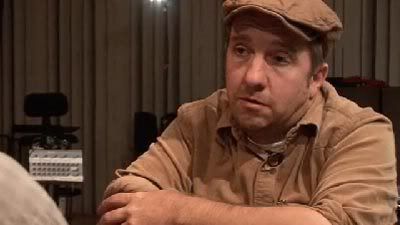

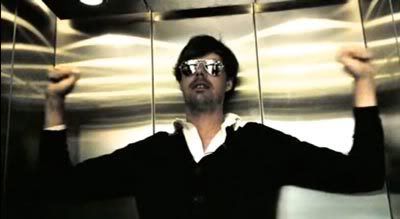
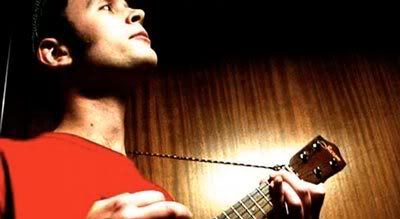
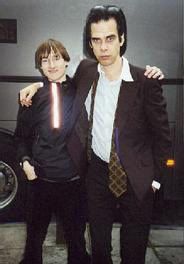 The first London gig was good, the second was even better but neither was as awesome as Manchester a few days before. Although I was now twenty Joy Division was still high on my list of fave bands so when in Manchester I went to visit
The first London gig was good, the second was even better but neither was as awesome as Manchester a few days before. Although I was now twenty Joy Division was still high on my list of fave bands so when in Manchester I went to visit 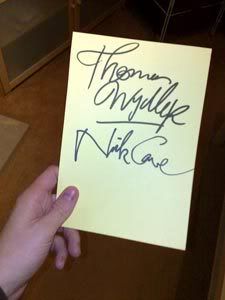 The day couldn't really get much better but if you've ever seen Nick live you'd know that it did get better, the gig that night is probably the best gig I've ever been to. He was on top venomous form, he flew about the stage like a bat, towered over the crowd like a spindly, dead tree and he even pointed at me (at least I'm going to believe it was me). The set was a healthy mix of old stuff and tracks off the new album, I actually left that night loving the new songs, I can't believe I ever doubted And No More Shall We Part cause its great; I will never feel the same way about anything after Nocturama though cause that stuff is just wack. I recorded the show that night, it's no soundboard quality but it really captures energy and essence of the night, The Mercy Seat was just out of this world, building up to a crescendo (is that the word?) that had me thinking my ears would explode in two fountains of hot blood. The other standouts for me were Oh My Lord, Red Right Hand, John Finn's Wife and The Curse of Millhaven.
The day couldn't really get much better but if you've ever seen Nick live you'd know that it did get better, the gig that night is probably the best gig I've ever been to. He was on top venomous form, he flew about the stage like a bat, towered over the crowd like a spindly, dead tree and he even pointed at me (at least I'm going to believe it was me). The set was a healthy mix of old stuff and tracks off the new album, I actually left that night loving the new songs, I can't believe I ever doubted And No More Shall We Part cause its great; I will never feel the same way about anything after Nocturama though cause that stuff is just wack. I recorded the show that night, it's no soundboard quality but it really captures energy and essence of the night, The Mercy Seat was just out of this world, building up to a crescendo (is that the word?) that had me thinking my ears would explode in two fountains of hot blood. The other standouts for me were Oh My Lord, Red Right Hand, John Finn's Wife and The Curse of Millhaven.
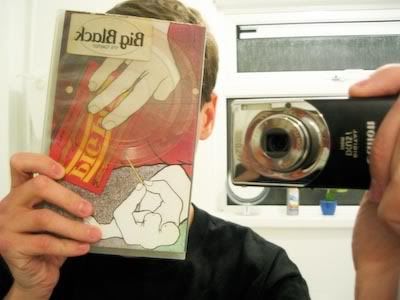



 After the supports left to go on stage I said hello to him and said that his brother said I could take some photos and he just went "uh-huh", didn't look up, I asked him how ATP went and he said "uh-huh", I asked if he minded me taking some photos and he said "uh-huh", not once lifting his head. I gave him a set of comic badges I'd bought for him with "pow" and "zapp" and stuff on them, he said he really liked them and right away just zoned out again. I snapped one pic of his reflection in the mirror and left him to his thoughts.
After the supports left to go on stage I said hello to him and said that his brother said I could take some photos and he just went "uh-huh", didn't look up, I asked him how ATP went and he said "uh-huh", I asked if he minded me taking some photos and he said "uh-huh", not once lifting his head. I gave him a set of comic badges I'd bought for him with "pow" and "zapp" and stuff on them, he said he really liked them and right away just zoned out again. I snapped one pic of his reflection in the mirror and left him to his thoughts. I spoke to his brother upstairs who said he was ok during soundcheck but had just gone out of it. He said that he ended up playing both days at ATP and an outdoor show as well and that he'd had a really good time. He said he'd probably be in better spirits after the gig so I decided to leave him to it until then.
I spoke to his brother upstairs who said he was ok during soundcheck but had just gone out of it. He said that he ended up playing both days at ATP and an outdoor show as well and that he'd had a really good time. He said he'd probably be in better spirits after the gig so I decided to leave him to it until then. "I play shows and I say my fave musicians are Bobby Conn, Wesley Willis and Daniel Johnston and nobody knows who they are" obviously pulling out the most obscure dudes he knew to appear cool, so I said to him "but you're a big Springsteen fan, people have heard of him". Daniel said he was a big fan too and that he'd seen him 3 times, BDB of course was better than that, he'd seen him 30 times and actually played with him 5 weeks ago. He was such a twit! His girlfriend made him leave and on the way out the door he went "ahhhhh" like he'd just met a disabled child in a hospital. That really annoyed me cause Daniel very probably heard.
"I play shows and I say my fave musicians are Bobby Conn, Wesley Willis and Daniel Johnston and nobody knows who they are" obviously pulling out the most obscure dudes he knew to appear cool, so I said to him "but you're a big Springsteen fan, people have heard of him". Daniel said he was a big fan too and that he'd seen him 3 times, BDB of course was better than that, he'd seen him 30 times and actually played with him 5 weeks ago. He was such a twit! His girlfriend made him leave and on the way out the door he went "ahhhhh" like he'd just met a disabled child in a hospital. That really annoyed me cause Daniel very probably heard.

